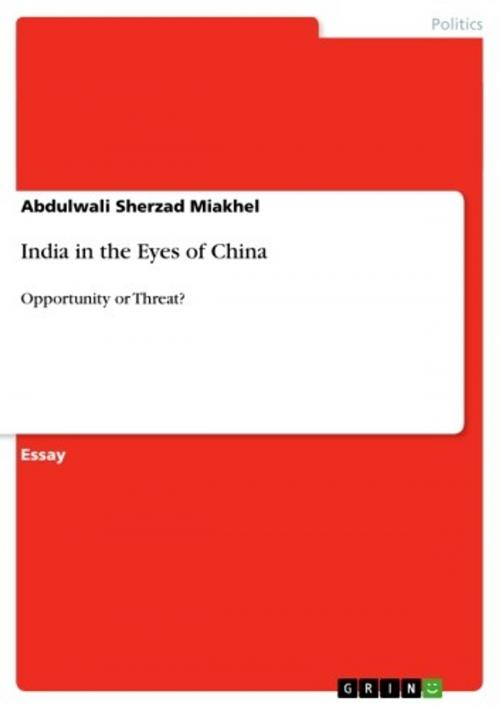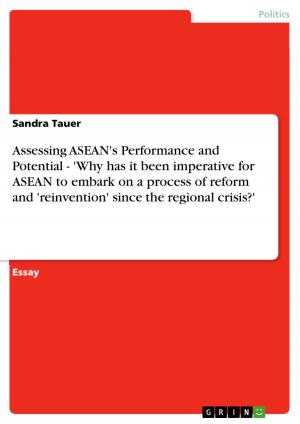India in the Eyes of China
Opportunity or Threat?
Nonfiction, Social & Cultural Studies, Political Science, International, International Relations| Author: | Abdulwali Sherzad Miakhel | ISBN: | 9783640357611 |
| Publisher: | GRIN Publishing | Publication: | June 25, 2009 |
| Imprint: | GRIN Publishing | Language: | English |
| Author: | Abdulwali Sherzad Miakhel |
| ISBN: | 9783640357611 |
| Publisher: | GRIN Publishing |
| Publication: | June 25, 2009 |
| Imprint: | GRIN Publishing |
| Language: | English |
Essay from the year 2009 in the subject Politics - International Politics - Region: South Asia, grade: A, Webster University (Political Science ), course: Study China, language: English, abstract: [...] India is geopolitically important for China from two critical and many imperative reasons. First Chinese leaders want to maintain economic growth to do so they need a stable domestic environment and peaceful borders. Secondly Chinese leaders do not want the United States to use India to contain China both militarily and economically. China and India fought a war on disputed territories in Ladakh area in 1962. India lost the war with great embarrassment due to weak and unskilled military, but now both China and India have a strong military equipped with both conventional and nuclear weapons. Priorities in both China and India have changed. Border disputes between the two countries are no longer top priority. Both China and India want to put border disputes aside and work for better bilateral relation. India is economically important to China for many reasons first, they want to improve bilateral trade with India. Secondly, they realized that international competition is no longer entirely military. It is also to grow economically, scientifically and technologically. Therefore, they want to cooperate with India both at regional and the global levels to become a world power. Chinese leadership wants to change the current unilateral international system to a more balance multi-polar international system in which they want an important role. Other reasons India is important are its rising economic growth, a potential future market for Chinese goods and services, a good source of raw materials for China's future demand and a possible strategic partner in a more economically balance multilateral international system.
Essay from the year 2009 in the subject Politics - International Politics - Region: South Asia, grade: A, Webster University (Political Science ), course: Study China, language: English, abstract: [...] India is geopolitically important for China from two critical and many imperative reasons. First Chinese leaders want to maintain economic growth to do so they need a stable domestic environment and peaceful borders. Secondly Chinese leaders do not want the United States to use India to contain China both militarily and economically. China and India fought a war on disputed territories in Ladakh area in 1962. India lost the war with great embarrassment due to weak and unskilled military, but now both China and India have a strong military equipped with both conventional and nuclear weapons. Priorities in both China and India have changed. Border disputes between the two countries are no longer top priority. Both China and India want to put border disputes aside and work for better bilateral relation. India is economically important to China for many reasons first, they want to improve bilateral trade with India. Secondly, they realized that international competition is no longer entirely military. It is also to grow economically, scientifically and technologically. Therefore, they want to cooperate with India both at regional and the global levels to become a world power. Chinese leadership wants to change the current unilateral international system to a more balance multi-polar international system in which they want an important role. Other reasons India is important are its rising economic growth, a potential future market for Chinese goods and services, a good source of raw materials for China's future demand and a possible strategic partner in a more economically balance multilateral international system.















